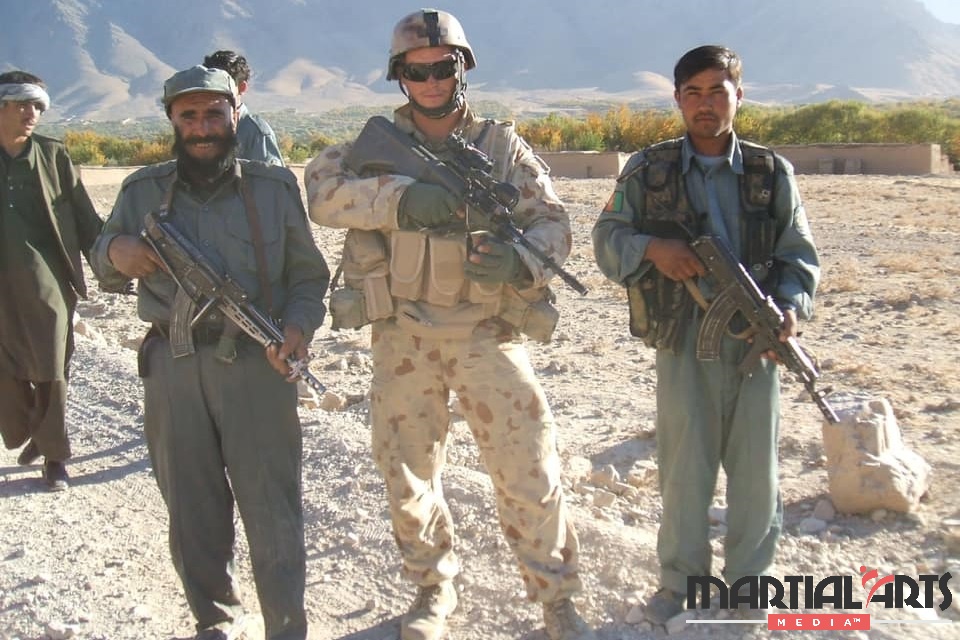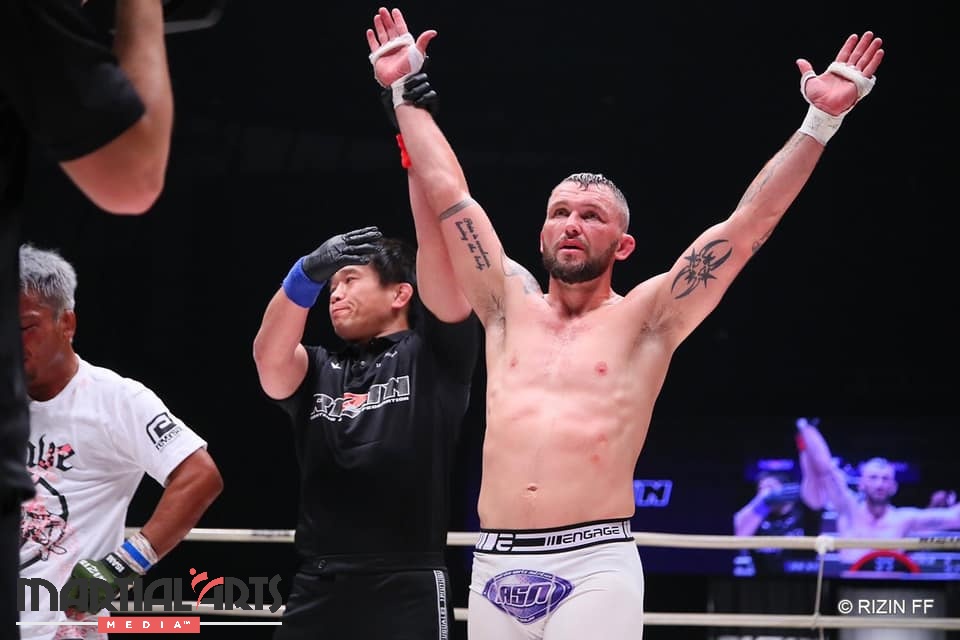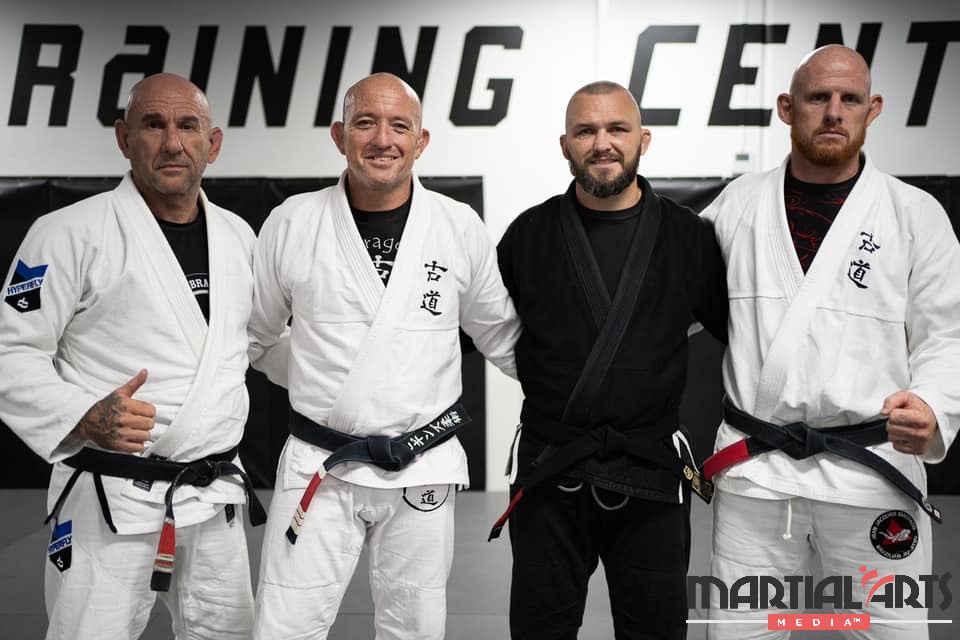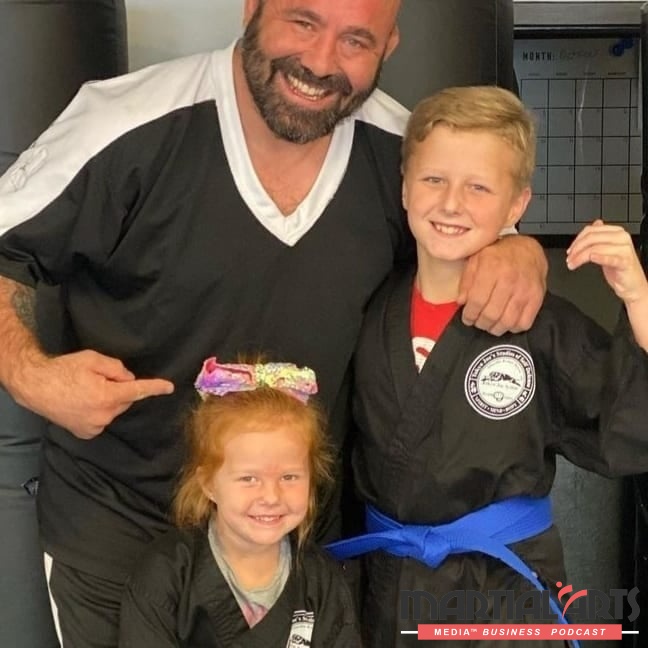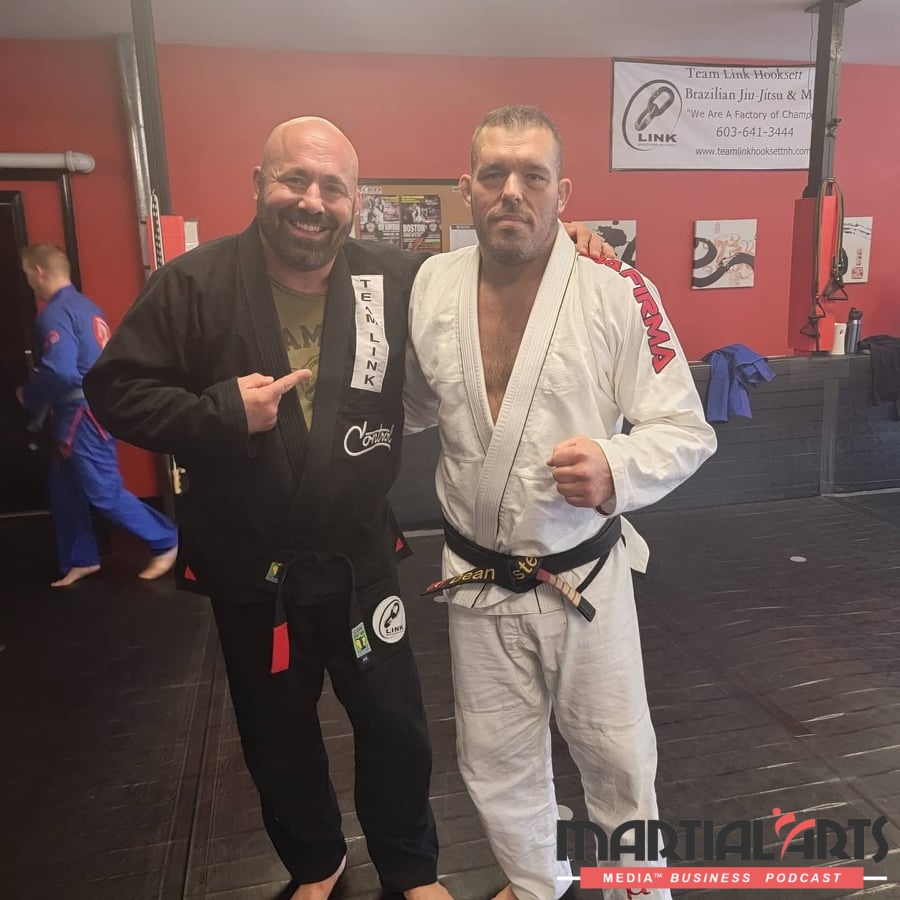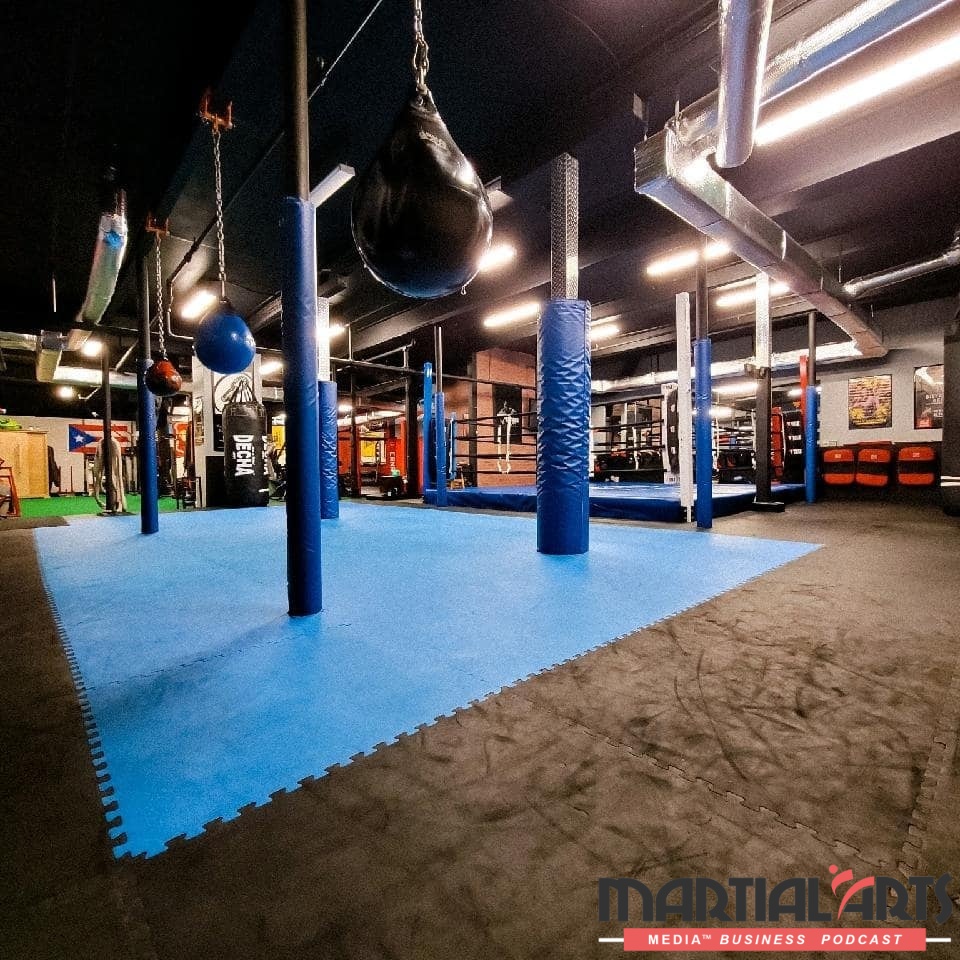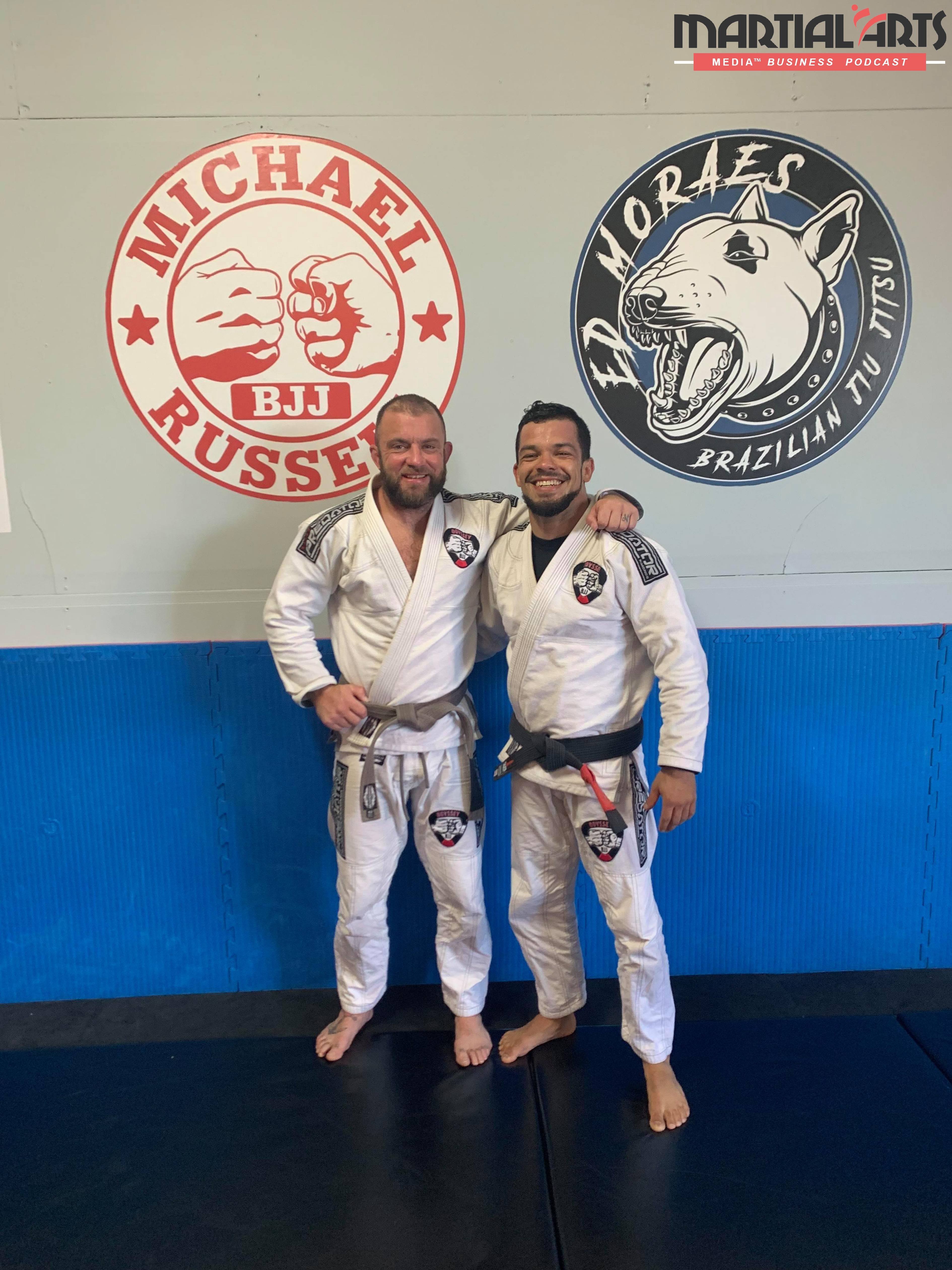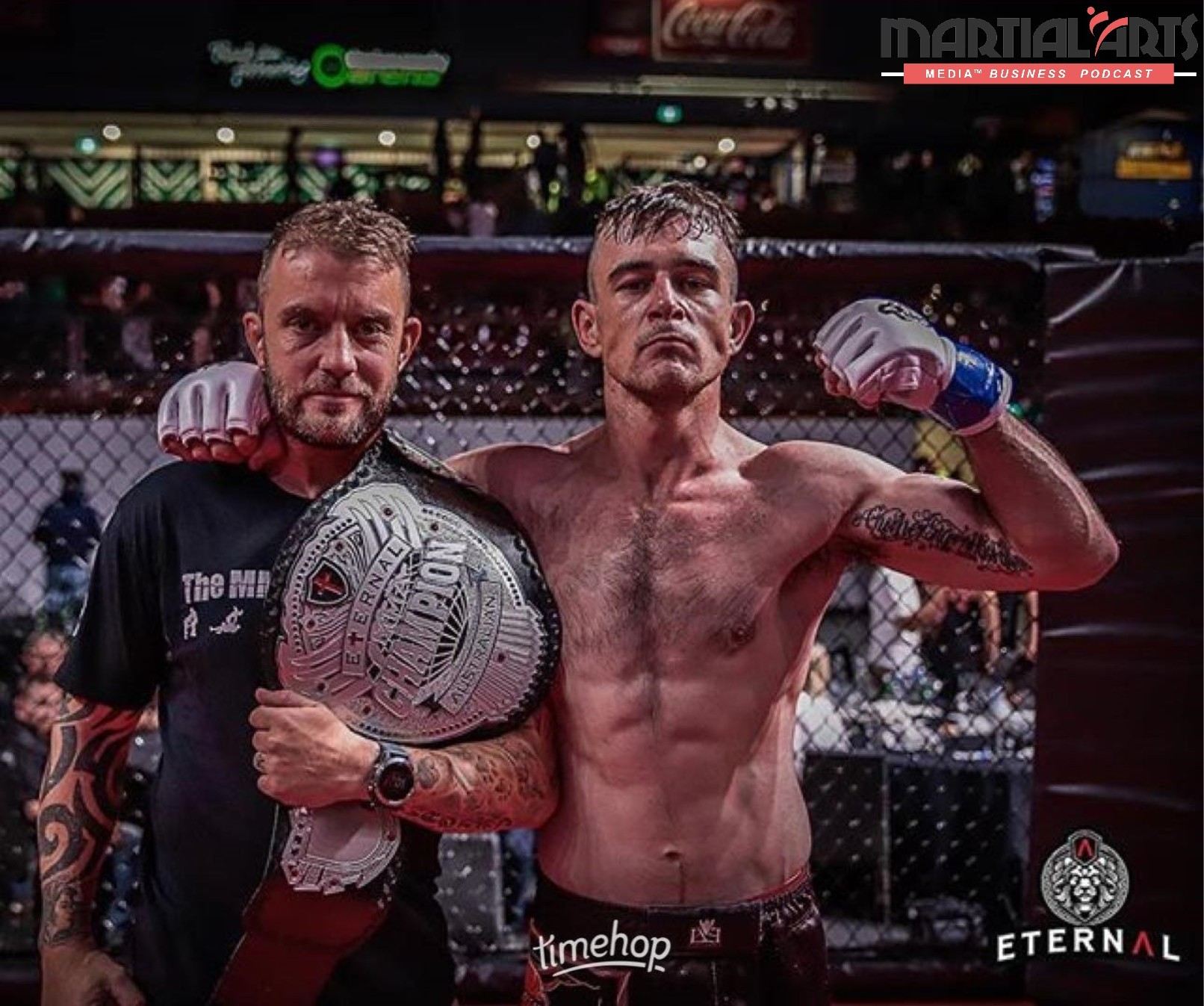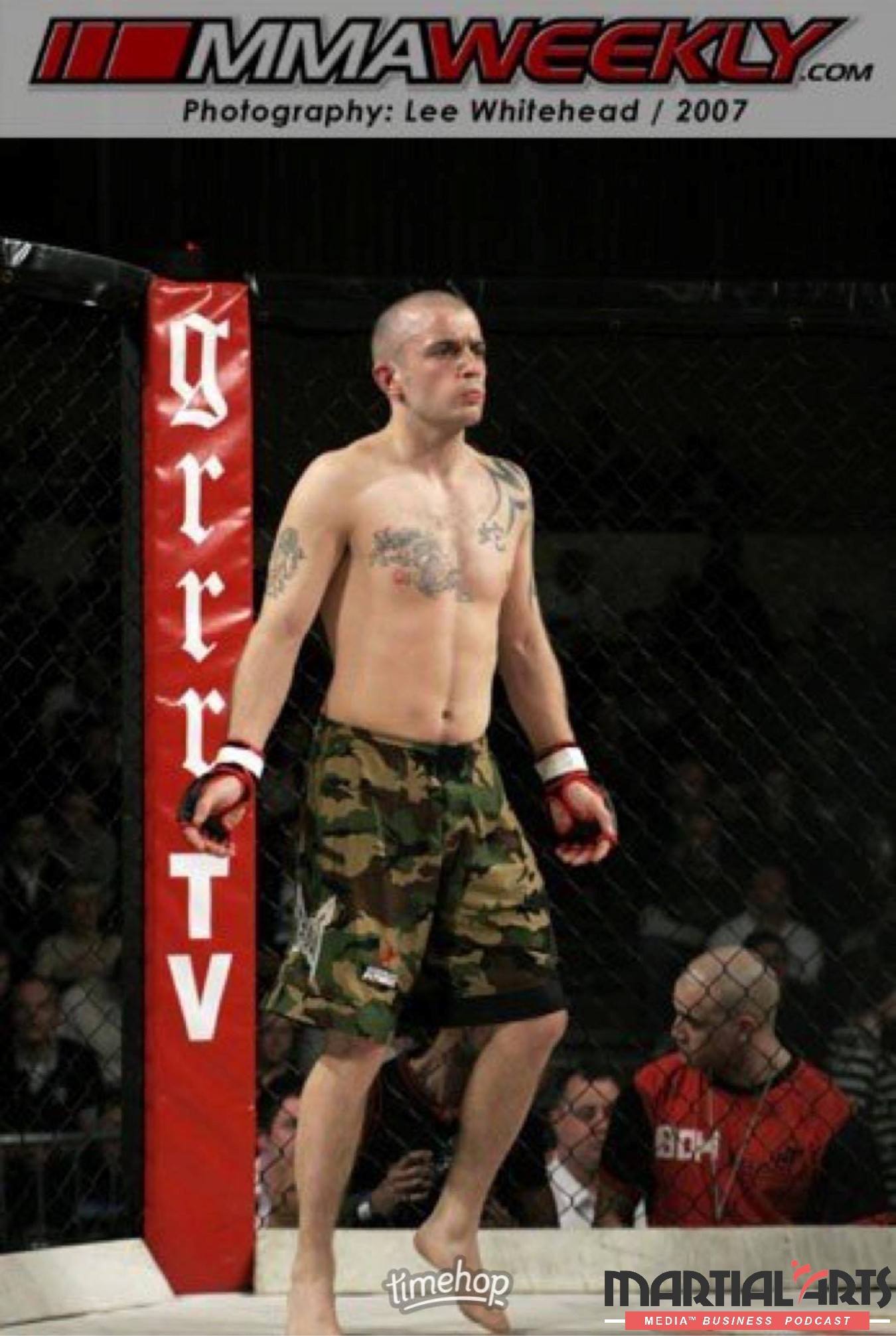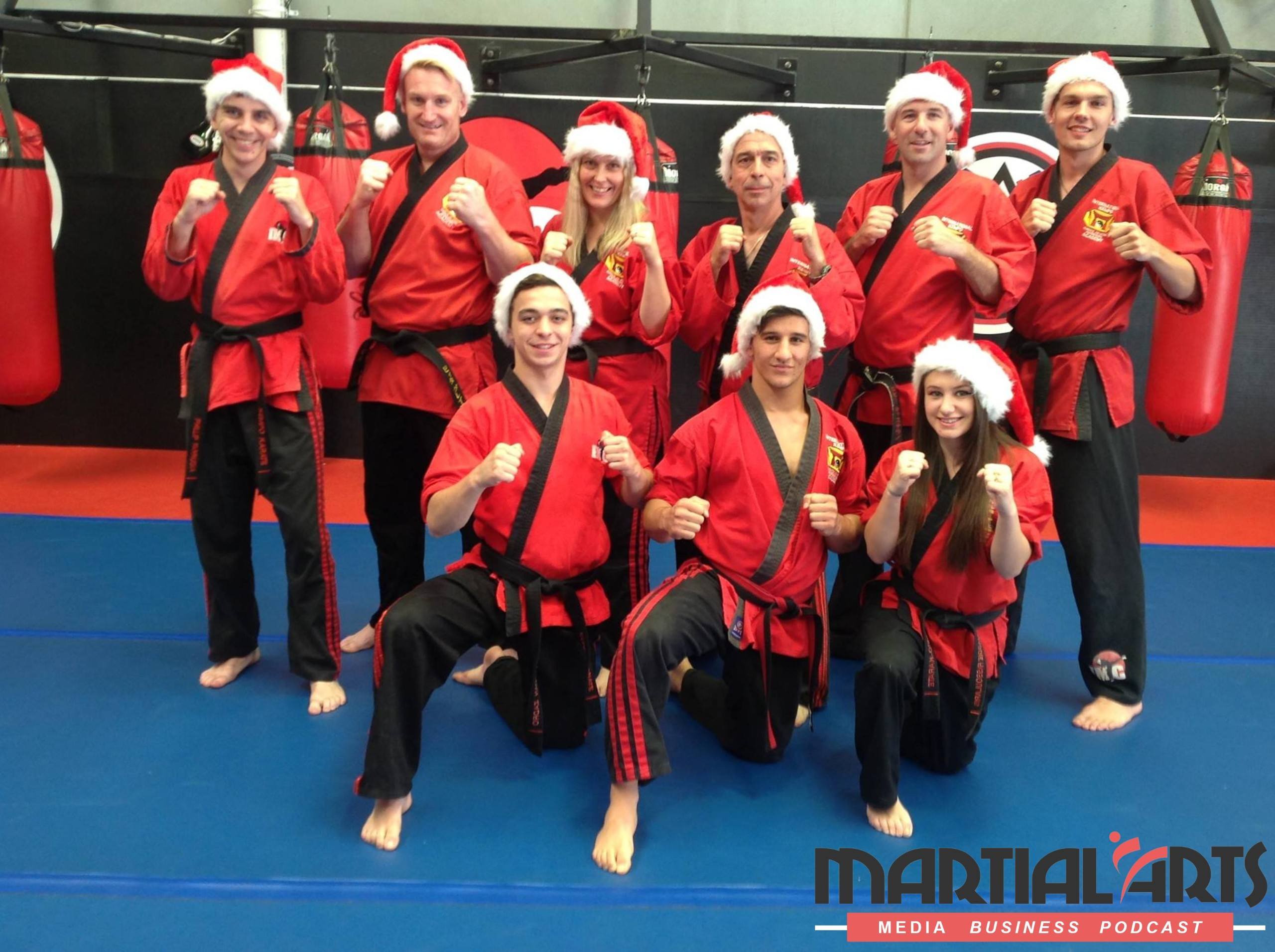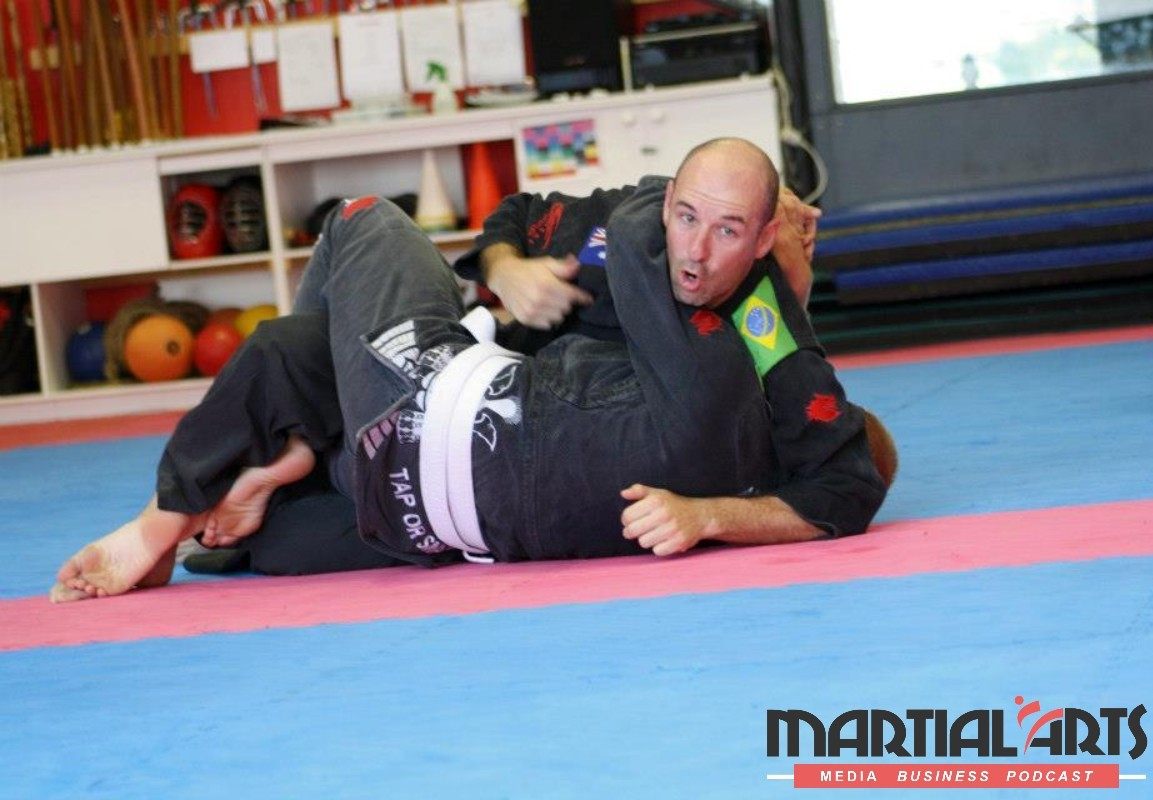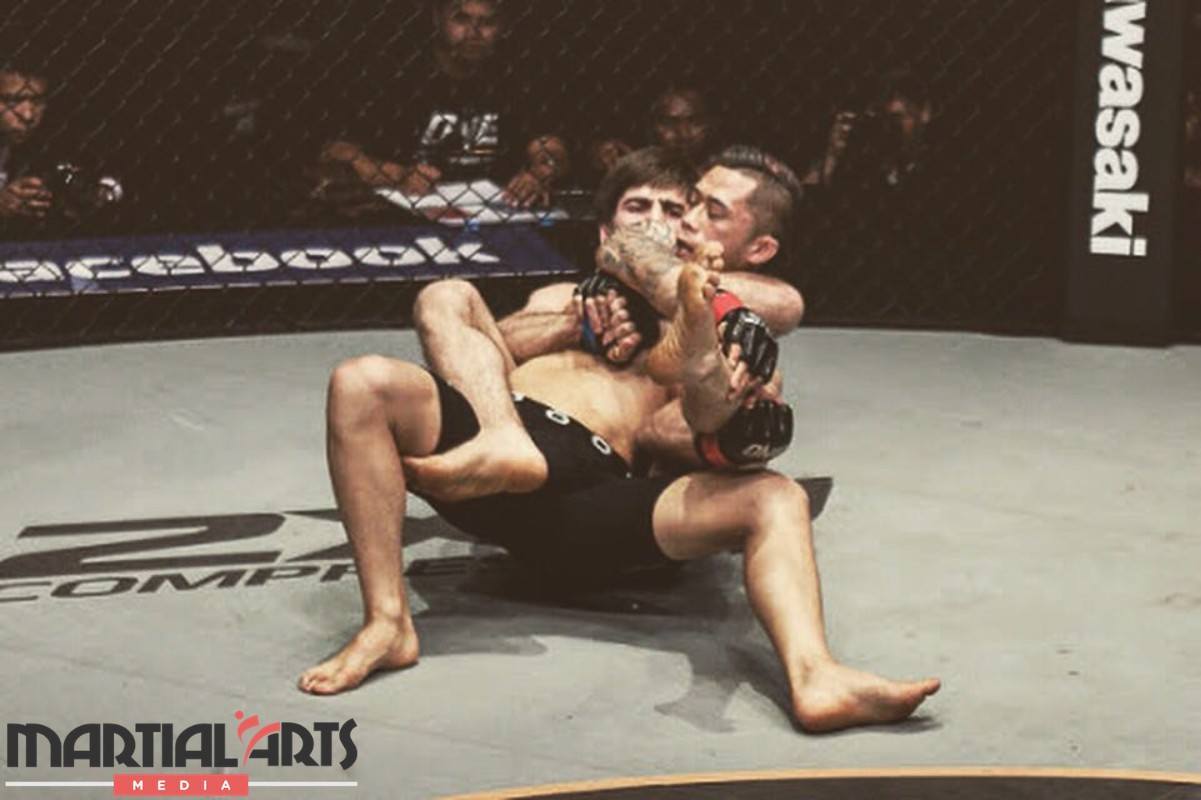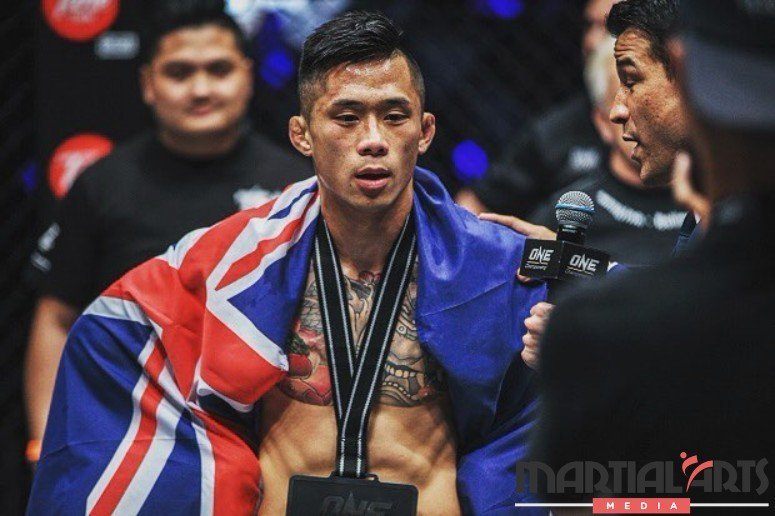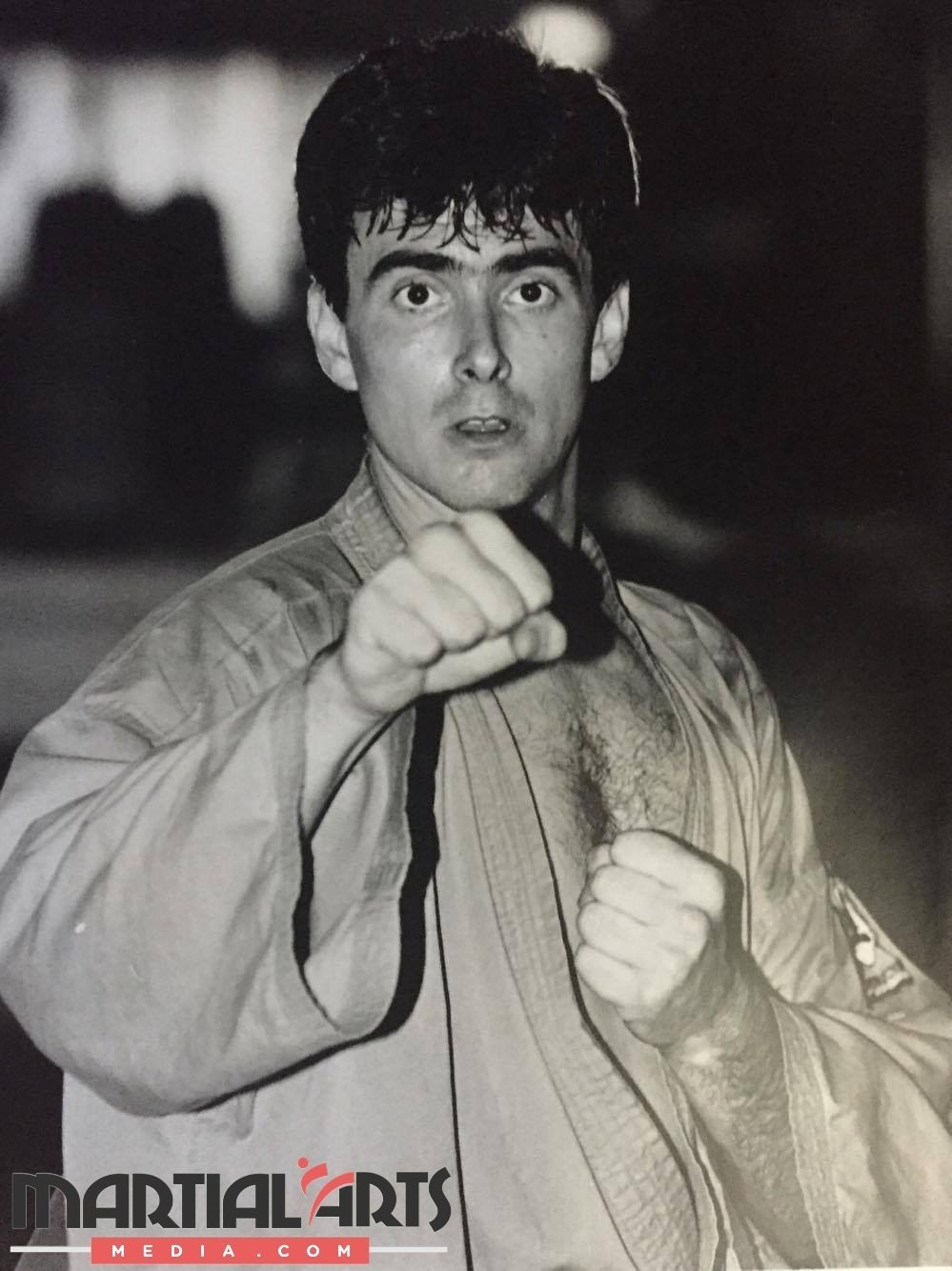IN THIS EPISODE:
- Base Training Centre’s most successful marketing strategy for generating students consistently
- How short-term commitments, like training camps, work well for marketing jiu-jitsu
- Damien Brown's journey from a UFC fighter and military man to a martial arts business owner
- Opening new locations by gut instinct and finding the right partners and locations
- How to ensure children between the ages of 4 to 13 love jiu-jitsu until they turn 16
- And more
*Need help growing your martial arts school? Start Here.
TRANSCRIPTION
My job is to make sure that any child between the age of four and 13 loves jiu-jitsu until they turn 16. If I'm too hard on them and they hate it and they don't like it, they leave. My job is to make sure that I teach them jiu-jitsu but I make sure they have enough fun that they want to stay in jiu-jitsu until they're 16.
When they're 16 they get graded as an adult, they start learning as an adult. It's a little bit different. They get to make their own choices. But if I can make them enjoy it that much that they stay from the age of four until 16, then I've now got a long-term member, I've got a kid that's done jiu-jitsu for 12 years that's now going to get a blue belt and go on to be a great adult addition to my gym.
GEORGE: Good day. George Fourie here. Welcome to the Martial Arts Media™ Business Podcast. Today I'm joined by a professional MMA fighter, UFC Fighter, and owner of Base Training Centre in Brisbane, Damien Brown. Welcome to the show.
DAMIEN: Hey, man. Thanks for having me. Appreciate it.
GEORGE: Good stuff. You've had a complete career between martial arts and your business. But before we get into the good stuff, a question I always like to ask upfront is, what's been your go-to marketing strategy, the thing that you guys do that generates the most students for you on a consistent basis? Consistently or that one thing that's the hook.
DAMIEN: Typically, the greatest marketing strategy we had was Facebook Ads. Social media is so big now. If you're not using it then you, you're either behind the times or you're just too stubborn to do it. Potentially, you don't know what you're doing so you outsource it. I'm a massive believer in outsourcing anything that's not your line of expertise. I just think that everyone should be advertising on social media.
GEORGE: Yes. Cool. Now, for you guys, when you do the ads, do you have specific offers that you run, like mini-courses or challenges, or just a straight free trial, or paid trial that works best?
DAMIEN: We market training camp-type situations and people typically don't want to commit to longer, especially in martial arts because most people have a reasonable amount of anxiety with just starting, so the idea of doing it for 12 months is terrifying.
Any short-term commitment that is enough to help a person understand that they need to be accountable but also not long enough that it creates fear of being locked into something that's terrifying, I guess. You got to find a balance between that.
The thing with martial arts, particularly jiu-jitsu in our case, is that it takes you about three months to learn how to swim and that's without any knowledge. You just got to learn what's even going on.
Most people position-wise don't know what's going on, concept-wise don't know what's… Forget techniques. It takes you about 12 weeks to get your head around anything. I think that's a good timeframe to get people to commit to but even sometimes that can be too long.
I think from a business point of view, no lock-in contracts are ridiculous for adults. But from a martial arts point of view, 12-month contracts sometimes can be a big hump in the road to getting over. Somewhere in the middle, there is pretty good and we advertise it like training camps.
GEORGE: I love that, training camps. You guys focus on jiu-jitsu. I'll zoom back into a bit of the marketing chat and so forth, but give us a bit of a rundown. I've got a bit of an idea of your story, of where you started, but if you could give us a roundup. Where did it all begin and how did you get into the martial arts space?
DAMIEN: Martial arts for me was a non-negotiable from my dad when I was six, I think. I could play any sport I wanted as long as I did martial arts. I played football, and rugby league and did karate, particularly Zen Do Kai back then. I did that for about seven years. Early teens, we moved to somewhere where there was none so football it was for a few years.
Then, I joined the army when I was 21 and I needed something to get my head straight and get back into fitness after some surgery in the military, so martial arts. I just turned to it again and I've been doing it ever since. In my early twenties, started kickboxing again and then went from kickboxing to jiu-jitsu, jiu-jitsu to MMA in a short period of time. And basically, that led me to 13 years later and two gyms.
GEORGE: Very cool. If you can go a bit deeper if we go back to just… You went from training then you started the MMA career. What pushed you to go to that level? And that was after the military, right?
DAMIEN: No, it was during the military time actually.
GEORGE: During the military.
DAMIEN: I didn't really know. When I did martial arts as a kid, I was very competitive. I competed every month in, as most people would know them, they're National All Styles Tournaments, they were around a long time ago. I don't know if they're still going but National All Styles was just basically a karate tournament and they ran everywhere.
And our karate school used to hire a minibus and we would drive at 3:00 AM down to Melbourne from Albury and compete all day and then drive back. It was the longest day ever at 3:00 in the morning, as a seven or eight-year-old, standing in the street waiting for the bus to pick us up. And then we'd get home sometimes at midnight on a Sunday night.
And that was my childhood. And I was super competitive. I played football, and everything was a competition for me, winning or losing. There was no such thing as anticipating and being rewarded for it, it was if you didn't win, you didn't win. I just had that in me.
When I turned back to martial arts for some fitness-based stuff and just to get my life a bit more sorted, then it only took about 10 months or something of kickboxing. And then, I started to feel like I wanted to have a fight. And then, I had one fight and won, and then I had another fight and won.
And then, the coach at the time, Ian Bone, talked me into doing jiu-jitsu. And then I was like, “I want to have an MMA fight.” We had an MMA fight, I lost that and then decided that I would never be submitted again, which actually turns out was bullshit because I did get submitted multiple times again.
But at the time in my head, being an infantry soldier, I was like 10-foot tall and bulletproof and I got humiliated, so to speak, or my pride was dented. I started doing jiu-jitsu six days a week, got right into it, and come back, 6-0 as a pro. And then, I made a lot of bad choices I guess, contract-wise and fight-wise, nothing that hurt me but just probably could have taken a better path in my career.
GEORGE: Can you give me an example?
DAMIEN: Yes, just taking contracts in Europe where you fly yourself and stuff like that as opposed to… Typically, a fighter that fights outside of their hometown gets their flights and accommodation paid for. Sometimes you get a bit of food money and you get paid. And then, there are promotions across the world, they'll give you opportunities but you have to fly yourself and stuff like that. I did that sort of stuff.
I took a fight on two weeks' notice in Macau, on Legend FC just because I really wanted to fight internationally, and, rather than seeing the big picture and just hanging around for a bit and taking my time, I rushed into an overseas flight. I got injured within that two weeks and I still fought.
Fighting injured, real bad injuries like MCL tears and stuff, fighting through that stuff, I think when you're an up-and-comer and you're not already at the top, I don't think it's necessary. I think you can take your time. I feel like there are just some mistakes I made along the way that I could have had a much easier path. But I definitely wouldn't change my path. I've got a lot of lessons that I get to pass on to my members and staff now, so it's pretty good.
GEORGE: That's awesome. Coaching your students going through that journey, what are the guidelines that you put in place for them? What do you advise them on how to go about their path?
DAMIEN: I wouldn't so much say I advise them about how to go on their path. More like they just do what I tell them they do. I used to manage myself and stuff; I get all my own fights and stuff like that. Whereas, my guys fight who I put in front of them and, if I tell them they're not fighting, then they're not fighting.
And so, it's more just making sure that I don't leave them to their own advice. And allow them to make the mistakes that I made because they're not experienced. And instead, I make sure that I'm there for them, that I'm guiding their career, and that I'm helping them become better athletes or better martial artists in between fights. I think more for me is just making sure that I'm in charge so they don't make those inexperienced mistakes.
GEORGE: Cool. You got into the fighting, how did the UFC and all that come about? How did you progress further in your career?
DAMIEN: I just started out 6-0 as a pro and it wasn't until I was 5-0 that I was like, “I could probably fight in the UFC one day.” But back then, it was difficult because when I was young it was more like trying to get into the UFC, you had to go overseas and train in America and be accessible, you had to have a visa.
And so, from that point of view, it was difficult for me because I had a job and my values were that I needed to support my family and my wife worked full-time but I still felt like I needed to be there for my family. Being the guy in my family that didn't earn any money, just didn't sit well with me.
I always had a full-time job. I didn't really think that quitting everything to move overseas was the right thing to do. Especially in a sport that's so young where you don't make enough money, you're fighting to support your family.
Maybe one year you make 100 grand, 150 grand with the bonuses or something, and the next year you'll make 10. And so, it just seems like a really unstable way of supporting your family. I never really looked at fighting as an income or a job but more as a side gig, which potentially is my issue.
Maybe I could have gone further quicker, who knows? But I don't regret it. I bought a house while I was fighting. I did everything that a normal everyday person should strive to do and I just committed a little bit extra of my time.
Instead of watching TV at night, I was at the gym and instead of going out on a piss on the weekend I was at the gym or I was asleep because I was too tired to go out anyway. I just did it as an extra on top of my job and that's just part of me. But getting in the UFC, once it became part of my mind and something that I thought was possible, then I didn't give up until I made it.
GEORGE: You made the right choices and you could have burnt all the bridges and just gone all in. But you decided to have the balance and it's obviously worked out really great for you. How did the schools then come about? How did you transition from all the focus on fighting to opening the schools? Let's talk about school number one.
DAMIEN: I always wanted to be in business. My dad's in business and other people in my family are in business. And I thought it was something in my future, it was going into business and I just didn't really have anything to do. If you drive a truck, you go into business, you typically buy trucks. And I was a baker, I was going to go into business when I was 21 and I pulled a pin on it, joined the army. You can't go into business with the army. It's like, “What can you do?”
It got to the end of my… Not the end of my fight career because I kept fighting but it got to the end of my UFC tenure and they released me and I thought to myself, spoke to my wife and said, “Now is my opportunity to either use what I've just done for the last nine or 10 years and teach it to the next generation and help people not make the same mistakes or I could throw it all out the window and work in my job at the jail for the next 32 years until I retire, and just job to maybe or stay there until I'm a bitter old, depressed prison guard and then try to retire happily but probably not because I got issues.”
I just thought I had two choices at that time and it was the perfect time in my life for me to go into business and to do something that I was not just qualified to do, but truly passionate about, which is teach martial arts. That was how it came about.
I just didn't want to do it while I was in the UFC but it had been on my mind, mainly because I didn't want to be tied down to coaching in the hours that I normally would train. I just come to a crossroads and pulled the trigger and that's how we opened the first one.
And then, we went from the first one, and in two years we opened the second one, which was just moving the first one to a building that was two and a half times the size. And we put massage and physio and everything in it. And we just got about three years in and I never really envisioned franchising or anything like that.
I thought it might be nice to have three or four schools but everything needed to make sense and I'm definitely a person that goes off my gut feeling and my gut feeling was telling me that it made sense to open another one.
Where we opened it, it wasn't where we were going to open it. We were going to go somewhere else, probably still will go there one day so I let the cat out of the bag. But just due to property options and whatnot in a pretty heavy market where there was only 5% of buildings that were available, trying to get something just seemed very difficult.
We opted for North Lakes. And my business partner up there, the second gym set up on a 50/50 type share situation and there's a management wage. And that's just how we set it up and it just made a lot of sense. I had the right person at the right time in the right location and we pulled the trigger on it. It's really good. I like it, it's taken off, and everything's working well.
GEORGE: But just give us a quick breakdown of the timeframe. One to 500 students, two locations, and that's over you said three years?
DAMIEN: Four.
GEORGE: Four years. Cool. How quickly did you grow the first one? And where's the first student-wise?
DAMIEN: We grew it really slowly. Before we ever advertised anywhere, everything was organic and we grew to 100 members in a year. And then, we finally made a profit one month and I took that profit and I spent it on advertising and then we just kept growing from there. And we've got a few hundred members now in one location. It's pretty good.
GEORGE: Yes, cool. Congrats. From all the school owners I talked to, in four years to go to two locations and 500 odd students, that's remarkable. That's fantastic.
DAMIEN: Yes, it's definitely been an incredible experience. I think what's missing in a lot of martial arts schools is typically martial arts for most people is a second home. And actually, it's funny, I had a conversation this morning with someone about commercialization and trying to avoid commercializing martial arts to make sure that we maintain the original values and purpose of it, which are self-defense, respect, discipline, confidence, self-esteem, mental health, positive mental health and all of those values. You want to maintain those. But most of all, everyone gets into some martial arts for self-defense and confidence.
I feel like there's a balance between commercializing that and maintaining it. And martial arts gyms are typically a home away from home and, if you commercialize it too much, you lose that home away from home feel because everything becomes about money and not so much about the martial arts and the friendships and the relationships and stuff that are built there.
I just feel like we've been very fortunate that my values fall in line with… I'm teaching something that I love, but it's more about how many people I can help and how people feel when they walk through the door and how they feel when they walk out of it, as opposed to how much money they've paid me that week or whether they're going to pay me for grading and stuff like that. We don't charge for grading. I don't focus a lot on the money; I focus more on what I can give people. And I feel that has made a huge difference for us.
We're not just a gym; we've never just been a gym. That's not what it's been about. And you can read all the reviews and people feel like we're more than a gym, that's where it's at, that's where retention is built, that's where new members are built, they walk through, they can feel the vibe. That's where everything comes from. And so, I feel like that's been huge for us.
GEORGE: How do you feel you started creating that within the culture? Because obviously, it started out as you. But as the student base grows, people might be attracted to you and your experience, and so forth, but it becomes about the school, the vibe, and the culture. How do you replicate that?
DAMIEN: It's like a tree. I was the seed and, as it grows, there are branches and, without the bottom branches, the next ones don't grow. I don't know what the average is, but there are probably 10 people that started in my gym that will get black belts out of the first 100. It's probably less than that, probably two out of the first 100 will get black belts because that's how many will stay.
But those two that stay, they form the foundation and then they pass it on to the next two out of the next 100 that stay. And all of a sudden, it's not just about me creating it. I got senior guys in this gym that, when I say senior, they've been here since the start, their kids are here, their wives train here, they train here.
And it's about on a Saturday; one will bring a car and a beer in and give one beer to everyone. And that's just who we are. “Do you want one? Do you want to hang out? Let's hang out after training and talk for half an hour.” And then, everyone goes their separate way. But no one has to go to the pub that night because everyone's just… We are our own family.
That goes, it starts at me, not that I'm promoting drinking or anything, but it's just an example, that's what one person could do. The other one would be like, “We haven't gone and done this for a while. We should organize that.” Or people said to me the other week, “We haven't had a barbecue for a while.” “You know what? You're right. We haven't. Been a few months, so let's have a barbecue.” It just starts with me and then it's others that recognize what I used to do and then we pass that on.
And I challenge my members at times, “This week, my challenge to you is to say hello to a person that you haven't spoken to or that you haven't seen or someone that you haven't talked to in the last three months.
Walk up to them, say, ‘Good day,' and ask them how they're going,” and that's going to change their day because you might be the guy on the other side of the room that they've seen for three months but never talked to.
And that happens when there are hundreds of members. Anyone that thinks a gym with 50 members in it is the same as a gym with 300 members in it or 500 members in it, it's kidding them.
It's just about when it's 50 members, it's me asking 50 people how they're going. When it's 100, it's me and 10 other people asking 100 people how they're going. If it was 1,000, I'd think that there are 50 members in that thousand that would've been with me long enough to go and ask the other 950 how they going.
And there's just a continuous flow from there. I feel like, as long as I started it with my values and my thoughts and what was close to me, which is giving more than you take, and then I'll attract people that do the same thing. And by doing that, it continuously gets passed along and that's how we maintain the culture.
GEORGE: That's amazing. Do you do things differently on the mat with that as well, within your classes and your teaching to really emphasize that, to put focus on building the culture?
DAMIEN: Yes, of course. I think any gym does, really. Sometimes I'll grab all the color belts and tell them they will roll with a white belt tonight. Sometimes I'll say, “Go with someone you haven't been with for three months.” Sometimes I'll get them in groups of three and make sure there's a white belt with every group.
And there are different ways that you can make people feel included. And at the end of the day, inclusivity is what everything's built on. If people feel excluded, then they'll go somewhere else. There are strategies that we put in place on the mat to make sure that those people who always go to one end of the mat, it's what happens with us, they all form up and then they go to one end of the mat. It's like all the white belts are down here and all the color belts are here.
I'll look around and sometimes we'll have 10 females in the room and typically females in the gym have a lot of anxiety about rolling with men and stuff like that. Particularly in jiu-jitsu rather than karate where there's a lot of contact. And jiu-jitsu really invades your personal space. Sometimes I'll particularly partner them up with people in the gym that I think are reasonably chill or super experienced and get them flowing because it's good for their confidence. And then, when their skillset matches their confidence, then they can hold their own and they'll roll with whoever they want. There are all different sorts of strategies for a coach.
I think one of the biggest assets you can have as a coach has been able to read your room. You've got to understand who is who, where they're at, what they're scared of, whether are they a threat, can they potentially hurt someone because they're dangerous with their skillset as in inexperienced with their skillset, they believe they're better than they are.
There are all sorts of things you got to be able to do to manage an environment like that. And my biggest job is trying to teach my coaches how to read the room. I feel like I do it reasonably well, but I've done a lot of instructing and military and stuff like that. And typically, you've got to always be able to read people. And I've worked in jobs where I've got to read people in confrontational-type situations as well.
And I'm probably hyper-alert; it's probably the good thing my deployment did for me. I'm very hyper-alert, hypersensitive, so I'm always looking around, everything's going on. And so, one of the biggest things for me is probably trying to teach my coaches how to read the room and stuff like that. Most of us start out in a gym knowing the technique we're delivering and that's what gets us a coaching gig.
But coaching is more than that and everything comes over time. Probably trying to teach them is a big thing at the moment, and then get them to put strategies in place to be able to manage the room as well. Definitely, there's a lot to it, that's for sure.
GEORGE: Yes, I love the focus on the awareness and how you're in tune with who has got what fears, reading a room, breaking up the groups as they segregate into different parts.
Transferring your martial arts skills, that's one thing. But then, transferring skills that you picked up potentially in the military and you've got a different level of awareness of picking things up, do you find that really hard to transfer to your coaches?
DAMIEN: I think the hardest thing to transfer to other people or to teach other people is instincts. Anything that becomes common sense and instinctual is the hardest thing to pass on. Anything that's educational, there are ways to read a room, so to speak, or there are strategies, educational type stuff to read a room.
And then, there's just you can just see people and start to feel that people are… If you feel that someone's a problem or someone can go from zero to 3000 really quickly, there's no strategy to pick that up. You just got to be aware of your surroundings and be aware of who is on the mat and whatnot.
You can teach them how to put things in place to make sure that those people are controlled, but you can't teach them how to identify those people. That's just something they've got to have time in a coaching role to be able to do.
The more time they run classes, the more they're in charge of classes, and the more they'll pick up on certain people. But as far as the management of members and strategies for how to run a class, you can always teach them that stuff, and that's pretty easy.
GEORGE: Damien, great. I've got two more questions for you. You mentioned that your dad really enforced your martial arts journey. How have you adapted that with your kids? Is martial art a non-negotiable? And if it is, would there be a point where you maybe back off?
DAMIEN: That's an interesting question because it horns a dilemma for me. Martial arts is a non-negotiable for my son, but it's not forced because this is my life and I want him to love it. He has to do jiu-jitsu no matter what, but I don't force him to do it 3, 4, or 5 times a week. We ask him if he wants to do it, every day there's a class on and, if he says no, we take him home and make him do his homework.
And if he says yes, we take him in and he does class. He had his first game when he was 22 months old and he used to just roll with me for a couple of years. And then, he asked to start classes so we put him in classes. And then, he went through a phase where he didn't want to do it so we took him out.
And I think my dad didn't have to force me but forced my sister. But he didn't have to force me because I loved it anyway. But it was a non-negotiable at the start like, “This is what you're doing.” I feel like the discipline, the respect, and everything that I got from doing martial arts, it's hard to put your finger on exactly what it was. But when people ask me how we teach them that, I feel like, particularly in this day and age, kids get the discipline, respect, and all that from listening to someone that's not their parent.
Teachers have no power. Anyone else in their life that's teaching them anything has no power. You put your kids in martial arts, you let them on the mat, you walk away, you sit upstairs, you sit outside, whatever it is, and you let that person teach your kids for the next 30 minutes in an environment where you basically sign off on allowing them to put them in lines, put them in ranks and pull them up for talking over people, pull them up for poking their friend on the mat or tripping a kid over.
That stuff needs to be chipped and there's just no one in this world that has any power to do it anymore. But even when we did, martial arts is just such a great teacher of all of those things because martial arts coaches typically don't just let kids get away with tripping kids over or talking over them.
Physical punishments, whatever it is you decide to do as in pushups, bear crawls around the mat, squats, something like that, it's all just more exercise and burning your kids out. But at the same time, they get that discipline and respect from that. By doing something fun to them, they're learning how to be respectful at the same time. And then, they get better and, with getting better, come confidence and higher self-esteem and stuff like that.
I think that just martial arts all around is amazing for kids. And so, my son has to do it, fully non-negotiable. But I can't force it because it's my life and I don't want him to grow up and hate it. I've definitely had multiple conversations with myself on what the best approach is and I just think just letting him do it when he wants to do it, if he hasn't done it for a while, we make him do it.
If he has a week off or he gets a week and a half in and he hasn't done a class, we just say, “Hey, mate. You haven't done a class for two weeks. If you go in tonight and you do class, you can stay for 20 minutes and play with your mates afterward.” And they come upstairs and play. And he gets to play with his mates. He's an only child so he loves playing with other kids and so he gets to play with his mates and does jiu-jitsu.
And he's good at it. He is done a comp already and got a couple of medals. We just don't force it. But he asked me a bunch of questions today, funny enough, on the way to school about jiu-jitsu and what he's got to do to get to the next belt and stuff like that.
He's starting to get interested in it. It's just taken time and he's not as good as some other kids at his age despite the fact that his dad's a black belt. And that's just because I feel like there's a fine line between balancing and forcing it onto your own child when it is your life. I don't want my son to hate coming to the gym with me.
GEORGE: Yes, the longevity of it. For myself. I'll probably force my son into Zen Do Kai from five to seven, and then Muay Thai, and then to the point that he turned around and said, “Dad, I don't want to do this anymore.” It's been a few years, but he's now 16, 17, and he's talking about Muay Thai again.
I'm confident it's going to loop back. My daughter, I forced her into jiu-jitsu and then we moved to the Sunshine Coast I took her to a place and she fell on her arms and she said, “No.” I was like, “Okay, it's time I back off just a little bit.”
DAMIEN: Yes, it's just a funny one. And there was a lesson taught me by my mate Ian, was that our job as a coach is to make sure that kids between the age of whatever you start in your school, for us it's four to 13, the 14-year olds do our adults classes, but my job is to make sure that any child between the age of four and 13 loves jiu-jitsu until they turn 16.
If I'm too hard on them and they hate it and they don't like it, they leave. My job is to make sure that I teach them jiu-jitsu but I make sure they have enough fun that they want to stay in jiu-jitsu until they're 16.
When they're 16 they get graded as an adult, and they start learning as an adult. It's a little bit different. They get to make their own choices. But if I can make them enjoy it that much that they stay from the age of four until 16, then I've now got a long-term member, I've got a kid that's done jiu-jitsu for 12 years that's now going to get a blue belt and go on to be a great adult addition to my gym.
We focus on that, we want the kids to have fun, and we want them to learn jiu-jitsu, but we're not out here breaking their balls and making sure they do comps and being like, “You must be the best at jiu-jitsu.”
That's not why we're teaching kids jiu-jitsu, not why we're teaching kids martial arts. We're teaching kids martial arts so they can benefit from everything that martial arts offers. And to do that, they need to enjoy it long enough to do it. That's what we focus on.
GEORGE: That's so good. Damien, thanks so much for your time. Just one more question, what's next for you? Where are you headed with your journey in the martial arts and Base Training Centre?
DAMIEN: I don't know, man. I don't know.
GEORGE: Day by day?
DAMIEN: I didn't start my first gym with a plan to open something bigger. I didn't start my second location with a plan of opening a second gym. I didn't start fighting so I could make it to the UFC. I just do something and then see where it takes me.
And we've got two now, maybe we have three, maybe we'll do Base Jiu-jitsu, maybe we'll do… I don't know. I don't know what's next really, to be honest with you. I just focus on the two I got, focus on the members I have and make sure that they enjoy martial arts.
And to be honest, I think every business in the country is probably feeling the pinch of the interest rates right now. My job right now is to make sure the members we have to stay and make sure that they enjoy the environment that we provide and the martial arts we provide. And then, go from there, see if we can ride it out.
GEORGE: Cool. I'll loop back into your journey down the line and we'll see where things are at.
DAMIEN: Sure, man. That'll be good.
GEORGE: Thanks, Damien. If anybody wants to reach out to you or get in touch with you, how would they do that? Your socials, etc.?
DAMIEN: People can reach out to me on all social media at beatdown155. But particularly, if you want to train in martial arts, you're in the North Brisbane area, so Brendale or North Lakes and surrounds, you can reach out to us at Base Training Centre on Instagram or Facebook, or check out our website base-training.com.au. We offer a free class for everyone to try out to make sure we're fit for you.
GEORGE: Love it. Cool. Thanks so much, Damien.
DAMIEN: No worries, man. Thanks a lot.
GEORGE: Speak to you soon. Cheers.
DAMIEN: Appreciate it. See you.
*Need help growing your martial arts school? Apply Here.
Enjoyed the show? Get more martial arts business tips when you subscribe on iTunes, listen on Spotify, or watch and subscribe on Youtube.



